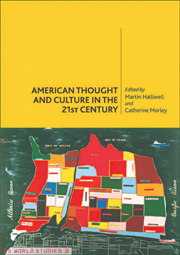Book contents
- Frontmatter
- Contents
- Acknowledgements
- Notes on the Contributors
- Introduction: The Next American Century?
- PART 1 POLITICS
- PART 2 SOCIETY
- 7 Contemporary Social Criticism
- 8 Religion in Post-Secular America
- 9 The US and Globalisation
- 10 The Future of Medicine
- 11 Technology in the 21st Century
- 12 America and the Environment
- PART 3 CULTURE
- Bibliography
- Index
7 - Contemporary Social Criticism
from PART 2 - SOCIETY
Published online by Cambridge University Press: 05 August 2013
- Frontmatter
- Contents
- Acknowledgements
- Notes on the Contributors
- Introduction: The Next American Century?
- PART 1 POLITICS
- PART 2 SOCIETY
- 7 Contemporary Social Criticism
- 8 Religion in Post-Secular America
- 9 The US and Globalisation
- 10 The Future of Medicine
- 11 Technology in the 21st Century
- 12 America and the Environment
- PART 3 CULTURE
- Bibliography
- Index
Summary
Alexis de Tocqueville, whose great work Democracy in America (1835–40) captured with such intricacy and eloquence the hopes and dreams of the new Republic just a generation after its founding, defined democracy as ‘a habit of the heart’. Despite their important differences and shortcomings, the founders' communal spirit breathed life into the laws, governmental structures, and social forms of the new nation, thus affecting the social, cultural, political and intellectual experience of Americans down to the early 21st century. Including, but not reducible to, a particular political system or set of social arrangements – from enfranchisement and representative government to rights, freedom, and justice – the notion of a democratic republic involved a sensibility, a disposition, or, one might say, a pre-disposition.
Concerns arise daily from across the political spectrum about how predisposed Americans remain to democracy. Observers point to a widening gap between rich and poor unheard of since the Gilded Age, corporate dominance of political campaigns and the airwaves, low levels of voting and civic engagement, an ethos of extreme individualism that values self-gratification over commitments to others, corruption in government and business, the decline of the family and civil society institutions, a crisis of morality and civility, and many other symptoms of a society at the breaking point. What is more, while once reformers might have interpreted these problems as cause for a renewal of ideals and efforts, many contemporary thinkers, critics and commentators – and politicians – raise more fundamental questions about the ideals themselves.
- Type
- Chapter
- Information
- American Thought and Culture in the 21st Century , pp. 115 - 126Publisher: Edinburgh University PressPrint publication year: 2008



